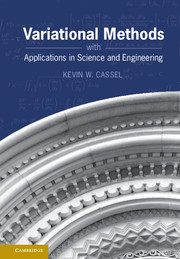3 - Rayleigh-Ritz, Galerkin, and Finite-Element Methods
from PART I - VARIATIONAL METHODS
Published online by Cambridge University Press: 05 July 2013
Summary
At a purchase cost of the order of, say, $300,000 or $400,000, the university can operate a computer for the education of its students quite economically… In a few years it is not unlikely that the computer may have settled immutably into our thought as an absolutely essential part of any university research program in the physical, psychological, and economic sciences.
(Alan J. Perlis, Computers and the World of the Future, 1962)Before proceeding to the applications of variational methods that will occupy our attention throughout the remainder of the text, it is worthwhile to pause and consider how the solution of variational problems is accomplished when a closed form solution is not possible. We have already encountered several such scenarios, particularly when dealing with functionals with multiple independent variables that produce partial differential equations, and we will encounter numerous more situations in the balance of the text.
If an Euler equation cannot be solved in closed form, we may obtain approximate solutions using the following techniques:
Solve the differential Euler equation using numerical methods, such as finite difference methods, spectral methods, or finite-element methods, where the latter two are based on the Galerkin (or other method of weighted residual) approach.
Solve the integral variational form approximately using the Rayleigh-Ritz method or finite-element methods based on the Rayleigh-Ritz method.
- Type
- Chapter
- Information
- Publisher: Cambridge University PressPrint publication year: 2013



